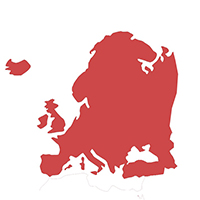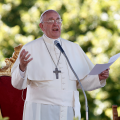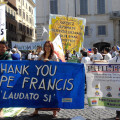Media Breakdown: The Pope’s Climate Encyclical
Yi Ying Teh | July 10, 2015.
The Pope’s encyclical on the climate is still generating discussion two weeks after it was released, demonstrating its far-reaching impact.
On June 18, Pope Francis issued an papal encyclical entitled Laudato Si or Praised Be, calling on the 1.2 billion Catholics worldwide to respond to climate change. The widespread media coverage in mainstream news sources reveal that the encyclical is making waves beyond Catholic circles to the broader public.
How has media coverage of the encyclical been so far? The Verb provides an overview:
The New York Times and The Guardian have the largest coverage of the encyclical. The New York Times’ up-to-date coverage of events in the Vatican can be attributed to its correspondent in Rome, Elisabetta Povoledo, as well as a reporter dedicated to the Pope’s actions, Jim Yardley, who writes My Travels with Pope Francis.
In particular, The New York Times has reported on the encyclical in relation to the announcement of presidential candidates running for the 2016 elections. Two of the 14 Republican candidates running for president, Florida’s junior senator Marco Rubio and former governor Jeb Bush, are Catholics. Most major news outlets have reported Bush’s rebuttal: “I don’t get economic policy from my bishops or my cardinals or my pope.”
The Guardian has a specialised environment desk, which provided real-time coverage of the press conference on June 18 when the encyclical was officially published. It covered the Pope’s observations on the UN climate talks, technology and business, and biodiversity loss throughout the four-hour-long event. The Guardian subsequently covered the climate march in Rome and a high-level conference which liberal activist Naomi Klein attended.
Most countries beyond the United States and Europe only have syndicated content, without specific analysis with regards to their local context. These include the Financial Times and Xinhua News in China, the Times of India, the Jakarta Post in Indonesia.
There was however wider media coverage of the encyclical in majority Roman-Catholic countries, such as the Philippines — a country that is extremely vulnerable to climate change and where over 80 per cent of the population is Roman Catholic. Rappler, a popular online news source, discussed excerpts of the encyclical that related to the environment in Philippines. The Manila Times covered comments from ex-Senator and climate change commissioner, Heherson Alvarez, who found the encyclical “inspiring”.
But has the encyclical had an impact?
Within Catholic circles, many faith-based organisations applauded the Pope’s move, and are using the encyclical as a launching pad to promote climate action. For example, the Global Catholic Climate Movement has been amassing signatures for a petition, which was also endorsed by the Pope. The petition calls on world leaders to address climate change and “drastically cut carbon emissions”. However, several Catholics suggest that the Pope has not gone far enough to rescind the ban on artificial contraception in the face of the deepening climate crisis. Instead, the encyclical blames inequality, not population growth, for resource scarcity. While the Pope seeks to ignite a paradigm shift within the church, it is clear that he is treading carefully to avoid alienating mainstream Catholics.
The New York Times pointed out that few priests and bishops mentioned the encyclical at the pulpit on Sunday June 22, four days after its release. Although an information guide from the United States Conference of Catholic Bishops has already been made available, it usually takes months for papal documents to be disseminated, the New York Times stated.
According to The Verb’s own interviews, faith leaders are optimistic. “Given that it was released 10 days ago, it has traveled pretty far”, Reverend Fletcher Harper of OurVoices said at the climate march in Rome. “In the long term, it will represent a fundamental change, not only in Catholicism, but also in world religions.”
The encyclical’s impact on other denominations of Christianity and other world religions are also already visible. Building on the momentum leading up to June 18, the Archbishop of Canterbury, the head of the Church of England, and other faith leaders in the UK relaunched the Lambeth Declaration. The declaration was signed prior to the 2009 Copenhagen climate conference. The declaration calls on their faith communities to reduce their own emissions and to pray for the success of international negotiations.
The Dalai Lama has praised the encyclical and even called on people power to motivate climate action at Glastonbury, a music festival in the UK. Based on The Verb’s sources, a gathering of Muslim scholars is also scheduled for September in Istanbul, where an Islamic statement on climate and the environment may be released. In addition, sermons about climate change are planned for the Jewish religious observances later this year, including Rosh Hashanah and Yom Kippur.
The encyclical also appears to have advanced the divestment movement. In the months leading up to the encyclical, the Church of England divested from the most heavily polluting fossil fuels while the World Council of Churches ceased all fossil fuel investments. Many religious organisations also timed their announcements on divestment to coincide with the encyclical. For example, the Episcopal church in the United States voted to withdraw investments in fossil fuels within its church holdings that are worth $380 million.
In contrast, according to the Guardian, the Vatican is hesitant to divest from fossil fuels, only stating that it ‘may consider [it], but is not committed to it.’ The Huffington Post also points out that no Catholic college in the United States has announced plans to divest from fossil fuels since the release of the encyclical.
Does the encyclical just preach to the converted? It is unlikely.
With many news outlets having published articles anticipating the encyclical and now covering events that follow it, the world is listening. It is after all, as a New Yorker headline reads, “a papal message that spares no one.”













comment